De Ierse schrijver Roddy Doyle werd geboren in Dublin op 8 mei 1958. Zie ook alle tags voor Roddy Doyle op dit blog.
Uit: Two More Pints
“– Have yeh made your mind up yet?
– A pint – same as always. I haven’t had to make me mind up since –
– I meant the election.
– Ah, shove it.
– Well, it’s either tha’ or the Greek default.
– Alrigh’ – fuck it. Who’s goin’ to
win?
– Hard to say. They’re all shite.
– I seen Mary Davis’s Sex an’ the City posters.
– There yeh go. An’ Mitchell. He said you can see the house he grew up in – in Inchicore, like – from the window of the Áras. An’ he’s goin’ to look out at it every mornin’.
– An’ shout, Fuck you, Inchicore.
– He could get the queen to do it with him the next time she’s over.
– A bondin’ exercise.
– Exactly. She probably never gets the chance to say “fuck” at home.
– Talkin’ abou’ fuck an’ the queen. What’s McGuinness up to?
– Says he’ll only pay himself the average industrial wage.
– The fuckin’ eejit.
– I’m with yeh. He says he’ll employ six young people with the money left over.
– Cuttin’ the grass an’ washin’ diesel. What about the Senator?
– Ah Jaysis. It looks like Greece is goin’ to miss its deficit target an’ has fuck-all chance of avertin’ bankruptcy.“
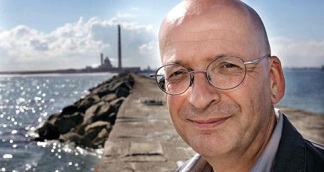
Roddy Doyle (Dublin, 8 mei 1958)
De Amerikaanse schrijver Thomas Pynchon werd op 8 mei 1937 geboren in Glen Cove, Long Island, New York. Zie ook alle tags voor Thomas Pynchon op dit blog.
Uit: Mason & Dixon
“Does Britannia, when she sleeps, dream? Is America her dream?– in which all that cannot pass in the metropolitan Wakefulness is allow’d Expression away in the restless Slumber of these Provinces, and on West-ward, wherever ’tis not yet mapp’d, nor written down, nor ever, by the majority of Mankind, seen,– serving as a very Rubbish-Tip for subjunctive Hopes, for all that may yet be true,– Earthly Paradise, Fountain of Youth, Realms of Prester John, Christ’s Kingdom, ever behind the sunset, safe til the next Territory to the West be seen and recorded, measur’d and tied in, back into the Net-Work of Points already known, that slowly triangulates its Way into the Continent, changing all from subjunctive to declarative, reducing Possibilities to Simplicities that serve the ends of Governments,– winning away from the realm of the Sacred, its Borderlands one by one, and assuming them unto the bare mortal World that is our home, and our Despair.”
(…)
“Facts are but the Play-things of lawyers,– Tops and Hoops, forever a-spin… Alas, the Historian may indulge no such idle Rotating. History is not Chronology, for that is left to Lawyers,– nor is it Remembrance, for Remembrance belongs to the People. History can as little pretend to the Veracity of the one, as claim the Power of the other,– her Practitioners, to survive, must soon learn the arts of the quidnunc, spy, and Taproom Wit,– that there may ever continue more than one life-line back into a Past we risk, each day, losing our forebears in forever,– not a Chain of single Links, for one broken Link could lose us All,– rather, a great disorderly Tangle of Lines, long and short, weak and strong, vanishing into the Mnemonick Deep, with only their Destination in common.”
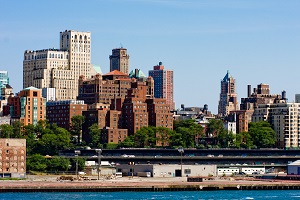
Thomas Pynchon (Glen Cove, 8 mei 1937)
De Downtown Brooklyn skyline, op de westpunt van Long Island
De Engelse schrijfster Pat Barker werd geboren in Thornaby-on-Tees op 8 mei 1943. Zie ook alle tags voor Pat Barker op dit blog.
Uit: Toby’s Room
“Elinor was walking head down when a near collision with somebody in a blue uniform forced her to look up. The corridor, almost empty when she set off, had become crowded with people all moving in the same direction: some nurses, but mainly patients. Faces loomed up in front of her, all kinds of faces; the bodies in their garish uniforms hardly registered. Men with no eyes were being led along by men with no mouths; there was even one man with no jaw, his whole face shelving steeply away into his neck. Men, like Kit, with no noses and horribly twisted faces. And others—the ones she couldn’t understand at all—with pink tubes sprouting out of their wounds and terrible wounded eyes looking out over the top of it all. Brueghel; and worse than Brueghel, because they were real.
She had to get away. She scaled along the wall, quickening her pace as the crowd began to thin. By the time the last of them had gone by she was almost running, and not looking where she was going until her nose came into violent contact with a man’s chest. Slowly, she raised her eyes, braced for God knows what horrors, and found herself looking at Henry Tonks.
“Miss Brooke. Good heavens.”
Her mouth opened but no sound came out.
“You don’t look at all well. Come along, let’s see if we can find you a cup of tea.”
Still unable to speak, she fell into step beside him.
“You must be visiting Mr. Neville,” Tonks said, pleasantly, as he unlocked a door.
“Yes, that’s right. I fancied a breath of fresh air.”
Even that little lie made her feel uncomfortable. This was a place for truth.”

Pat Barker (Thornaby-on-Tees, 8 mei 1943)
Cover
De Amerikaanse dichter Gary Snyder werd geboren op 8 mei 1930 in San Francisco. Zie ook alle tags voor Gary Snyder op dit blog.
Hay For The Horses
He had driven half the night
From far down San Joaquin
Through Mariposa, up the
Dangerous Mountain roads,
And pulled in at eight a.m.
With his big truckload of hay
behind the barn.
With winch and ropes and hooks
We stacked the bales up clean
To splintery redwood rafters
High in the dark, flecks of alfalfa
Whirling through shingle-cracks of light,
Itch of haydust in the
sweaty shirt and shoes.
At lunchtime under Black oak
Out in the hot corral,
—The old mare nosing lunchpails,
Grasshoppers crackling in the weeds—
“I’m sixty-eight” he said,
“I first bucked hay when I was seventeen.
I thought, that day I started,
I sure would hate to do this all my life.
And dammit, that’s just what
I’ve gone and done.”
There are those who love to get dirty
There are those who love to get dirty
and fix things.
They drink coffee at dawn,
beer after work,
And those who stay clean,
just appreciate things,
At breakfast they have milk
and juice at night.
There are those who do both,
they drink tea.
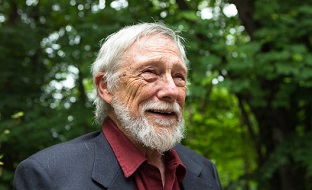
Gary Snyder (San Francisco, 8 mei 1930)
De Oostenrijkse schrijfster Gertrud Fussenegger werd geboren op 8 mei 1912 in Pilsen. Zie ook alle tags voor Gertrud Fussenegger op dit blog.
Uit: Das Haus der dunklen Krüge
„Die letzten Worte schrieb der Goldbart mit so fröhlichem Schwung, dass er mit der Feder über den Rand des Papiers hinausfuhr. Er ließ den Halter fallen und griff nach dem Glase. Der Kellner hatte es unterdessen zum zweiten Male gefüllt. Begeisternd durchrieselte ihn die moussierende Frische. Er atmete tief, erleichtert, glückselig. Er schlug das Blatt zusammen, senkte es in einen Umschlag. In der Tiefe seiner Seele fühlte er, dass er- nach seinem Vermögen- ein gutes Werk getan.
Der Kellner schlich heran. “Hat es geschmeckt, gnädiger Herr?” ” Wie noch nie.” “Das ist recht, gnädiger Herr.Darf ich noch einmal?” “Später- Standa.Wie geht´s?” ” Danke, gnädiger Herr!” “Danke, gut oder danke, schlecht?”
Der Kellner zögerte. Er war ein kleiner, hagerer Mensch mit einem zerknitterten Zwergengesicht. ” Weil der gnädige Herr schon fragen: es heisst, danke, schlecht.”
“Aber Standa- wieso denn schlecht?” “Ach.” Der Mann wand das weisse Serviertuch zwischen den Händen. “Der gnädige Herr sind sehr gütig. Der gnädige Herr muss wissen: wir wohnen draussen in Skurnan, im Pongratzschen Dwur.Jedes Jahr kommt dort das Hochwasser….”
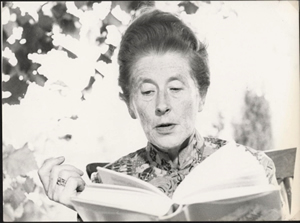
Gertrud Fussenegger (8 mei 1912 – 19 maart 2009)
De Amerikaanse schrijver en criticus Edmund Wilson werd geboren op 8 mei 1895 in Red Bank, New Jersey. Zie ook alle tags voor Edmund Wilson op dit blog.
Uit: The Sixties
„I am 72 today. Telegram from Elena: “We all seem well and shall be thinking of you Monday and send love.” Not quite reassuring. I am feeling unusually well today. Wellfleet, Autumn 1967
Monotony of my life and its limitations: I wake up first about 4 and read for a couple of hours. I look up from time to time and gauge how near morning is by the blue of dawn outside the window. Then I go to sleep again and have an unpleasant dream, from which I wake feeling rather worse than I had at 4 o’clock. I sit on the edge of the bed for a while and stare at my bare feet. I look in on Elena, who is lying in bed and who may or may not have had a good night. She says that she will soon give me breakfast and I tell her there is no hurry. I then go to my bathroom and sit on the toilet, reading Jules Re nard’s journal or something, which helps me to face the rest: getting the yellow goo off my tongue with a washcloth or towel, hawking up blood-embrowned phlegm, perfunctorily brushing my largely artificial teeth. I then sit in the middle room, and Elena brings me breakfast, at the end of which I take a digitalis. Before breakfast, I do serious reading, which I continue for a time after; but during breakfast, I read papers and magazines, which are easier to skim through and handle. I don’t get to work as a rule till 11 or 12 o’clock. Since I have been back from New York, I have done nothing but New Yorker articles, writing letters and catching up on this journal. About 3, we go to town for the mail, the papers and a pint of whisky. If it is fine and I feel up to it, E. takes me for a little walk like a dog, or a short drive. In the late afternoon I get a drink and shave, playing the phonograph — for which the enlarged room provides much better acoustics. Then I go into the middle room and play solitaire, slowly nursing my drink. Elena gets us a modest supper, after which I read or play more solitaire or am so muggy and sleepy that I go to bed and take a Nembutal or a whisky and go right to sleep. I now try to resist the temptation to finish my unfinished drink in the early morning or to supplement it from below.”
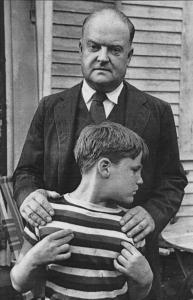
Edmund Wilson (8 mei 1895 – 14 juni 1972)
Hier met zijn zoon Reuel in 1949
Onafhankelijk van geboortedata:
De Nederlandse schrijver James Worthy werd geboren in Amsterdamin 1980. Zie ook alle tags voor James Worthy op dit blog.
Uit: James Worthy
“Is dat het? Serieus, Pol? Na alles wat ik je heb gegeven, na alles wat we hebben meegemaakt, serveer je me af met een cliché uit Amerikaanse sitcoms? Je haalt morgen al je spullen op, de hele pleurisbende, en daarna wil ik je nooit meer zien. Happy Days!’
Polly zit op de bank, ze ziet er mooi uit. Ze heeft zo’n hippiehaarbandje om haar hoofd, bij alle andere vrouwen vind ik dat dom staan, maar Polly lijkt door het kleurrijke bandje op Bo Derek. Een marineblauw truitje zit strak om haar imposante buste en op haar linkertiet zit een Afrikavormige broche. Met haar vuurrode lippen blaast ze in een mok muntthee, haar favoriet. ‘Je ziet er goed uit, James. Leuk die schoenen en die broek. Hoe gaat het met je moeder?’
Wat een laffe vraag, zeg gewoon waarom je hier bent en rot dan weer op. Of trouw met me. ‘Ja prima, druk op werk hè, je kent het. Alles goed met jouw moeder, Pol?’
‘Die vermaakt zich wel, hoor, morgen beginnen haar clubjes weer, linedancen, klaverjassen, ze is nog steeds dol op gezelligheid.’
Wat een gelul, ik hoop dat je moeder morgen een scheenbeen breekt, de aan borrelnootjes verslaafde zeug. ‘Goed om te horen, maar wat doe je hier eigenlijk, Polly? Wat wilde je bespreken? Wil je me terug? Hahahaha.’
Mijn voormalige droomvrouw kijkt bedrukt en gaat met haar handen door het haar, ze oogt onrustig. ‘Nou James, het zit zo, ik heb iemand leren kennen. Een jongen, een man. Zijn naam is Pete en hij is een kunstenaar.’
Ik breng mijn theekop naar mijn mond zodat Polly niet kan zien dat ik de woorden ‘vieze vuile loopse kankerhoer’ in mijn mangothee fluister. ‘Nu al? Maar je wilde toch gewoon even vrij zijn, genieten, onafhankelijk zijn, met je vriendinnen de hort op, die Thelma & Louise-shit?’
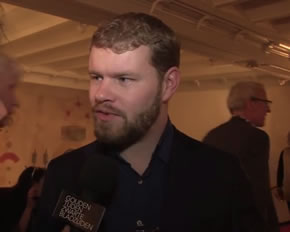
James Worthy (Amsterdam. 1980)
Zie voor nog meer schrijvers van de 8e mei ook mijn blog van 8 mei 2012 deel 2 en ook mijn blog van 8 mei 2011 deel 2 en eveneens deel 3.
